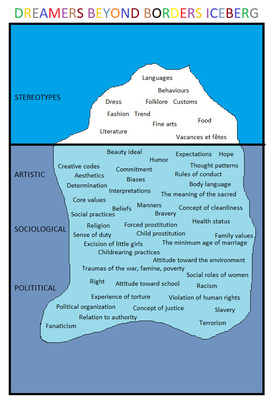 As part of our Dreamers Beyond Borders project, we have thus far only considered the visible aspects of migrants' cultural contribution and exchanges with their country of origin. Over time, our companies have integrated elements of different kinds. These elements have become our everyday life until becoming mere stereotypes.
As part of our Dreamers Beyond Borders project, we have thus far only considered the visible aspects of migrants' cultural contribution and exchanges with their country of origin. Over time, our companies have integrated elements of different kinds. These elements have become our everyday life until becoming mere stereotypes.
We will now have to consider another approach to the study of migrants. We will focus on what is less visible, the hidden part of the iceberg (doc 1). Migrations are phenomena of human mobility that have varied origins. Societal aspects are important.
Leaving your country in pursuit of a dream of a better life is a difficult and difficult decision.
Interest in motivations leads to looking at the hidden part of the iceberg. Migrants are beings whose life stories have forged their personalities. The social and political difficulties experienced in their countries of origin are part of their personal construction. Poverty, war, authoritarian or corrupt political regimes, or simply the search for a better paid job, made them determined beings to "leave".
Their journey is then accompanied by dramas, hopes and disappointments. Arrived at destination, the first happiness is that of security found.
Then the quality of their integration and inclusion will depend on our ability to understand their psychology as refugees or economic migrants.
Thus begins multiculturalism.
Some images using symbolism and art can also denounce the political aspects of this great human question. Solidarity is an essential value in Europe. Yet this essential value is far from being practiced by all. In many countries of the European Union we can see the old demons of nationalism, of the hatred displayed, of the withdrawal on oneself. These are reactive phenomena in the face of the massive migration of extra-European origin that the Union has been managing for the last ten years. Our lack of empathy and benevolence does not come from a lack of education.
Are European immigration policies appropriate? How do they generate reactions that are contrary to the European spirit and the values that melt its universal spécificté ?
Let us add to this that among the last countries entering the Union, from the Eastern countries or totalitarian regimes, many candidates for intra-European immigration have benefited from the opening of the borders to head west. European policy has built an economic Europe but the harmonisation of national rules of law and the value of work has not taken place and European social policy has partly failed causing many intra-European departures from the East West for 30 years.
Today these same countries with freedom in their entry into Europe are those who leave oddly the emergence of extremist, discriminating and xenophobic nationalist tendencies. Today we see the nostalgic ideologies of totalitarianism. All these rejection policies are contrary to the ideals of a Europe that has freed itself in the pain of Nazism as Stalinism but also of Titism. The list is not exhaustive. These diseases of social and intellectual regression now affect in part all European democracies.
The English far right led the United Kingdom into a dangerous and sad brexit. The UK pays 34 million euros per year to France to keep migrants in Calais. Italy is involved in an arbitrary policy against humanitarian vessels while European funds Fund Libya to intervene in shipwrecks of migrant ships that are fleeing this regime where they are beaten, sold or Murdered. Germany and France, however, the homeland of human rights are won by these ideologies which are based on the fear and rejection of the migrant.
But history shows us that beyond rejection reactions, integration is a reality. The glimmer of hope does not extinguish. Humanism will always be a winner in the face of hate-for-rejection policies that ultimately degrade only their perpetrators.*
In the face of the current migratory waves, the question of urgency forces us to remain vigilant and alert, not only from a political point of view but also from a humanitarian point of view.
The humanitarian issue becomes Central because it questions the question of human dignity.
The stakes are great, we must fight ignorance, racism and xenophobia. European education programmes are a reminder of the importance of defending the fundamental values of the EU.
Our ERASMUS project must now move towards a deeper and more accomplished reflection in terms of symbols and images.
We propose to sweep three approaches of study, political, sociological and artistic.
The artistic approach will demonstrate the richness of this multiculturality through European history and some great musical works.
Up to now, for the game we mainly made pictures about food, music, streetwear, … stereotypes.
Now we could go further with politic consideration, sociologic consideration and artistic consideration.
The idea is to create a document composed of a picture and under it several proposals.
First, find (on the Internet or Newspapers) a picture that has to provoque the viewer to react !
Always indicate Author date place and web link !
Then, if needed, find and write a question about the picture and immigration.
Finally, write few words as answers/proposals.
Working Guidelines Year 2.docx